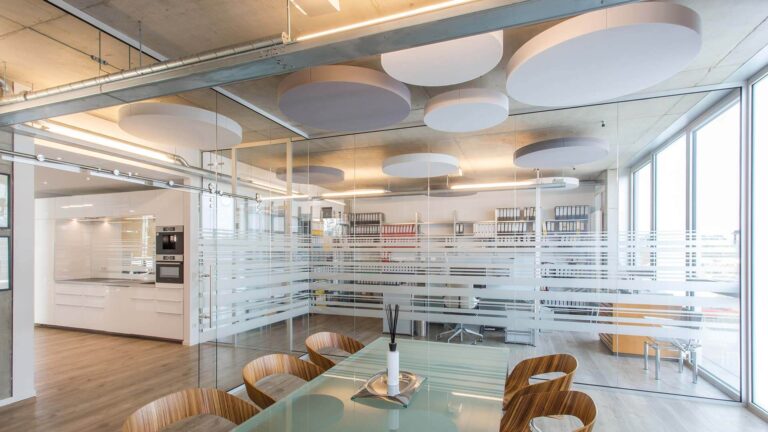Over the last couple of years, the price of everything has increased, especially energy, which can be a significant expense for many businesses. Anything you can do to reduce overall expenditure for a business is worth trying, and an excellent thing to consider is enhancing the insulation in your office.
By improving the insulation and making your office space more thermally efficient, you can reduce the energy needed to heat the place in winter and keep it cool during the summer. There are various types of insulation you can consider, and below, you can see different options to consider and the benefits they offer.
Fibreglass Insulation
When looking for a guide to ceiling insulation, fibreglass is one of the most common insulation options for domestic and commercial buildings, as it makes spaces more thermally efficient. The insulation is comprised of fine glass fibres, which are lightweight and easy to install.
This type of insulation helps maintain a constant temperature in your office, making it comfortable year-round. It also offers sound-absorbing properties, which can help reduce noise levels in your office and make it a more comfortable working environment for your employees.
Fibreglass insulation is a practical choice that is affordable, long-lasting, and easy to install, which is why it is the practical choice for many businesses when insulating their office space.
Mineral Wool Insulation
Another option for insulating your workspace to make it more thermally efficient is mineral wool insulation. Mineral wool comes from natural minerals like basalt or slag, and in addition to offering thermal efficiency, it is also fire-resistant. Due to its dense composition, it also has excellent acoustic insulative properties and can absorb sound waves and reduce noise levels in a busy work environment.
Another advantage of mineral wool insulation is that it is also moisture-resistant, preventing mould and mildew from forming and helping to create a healthier office space for your business. It’s also an easy-to-install insulation option, which is why it is a popular choice for many buildings throughout the UK.
Cellulose Insulation
When you want an environmentally friendly option for insulation in your workspace, consider cellulose insulation. This type of insulation is made using recycled paper and plant fibres and is treated with a fire-retardant chemical, making it ideal for commercial spaces. Unlike fibreglass and mineral wool, cellulose insulation is a loose-fill option blown into the walls and ceiling cavities, providing superior coverage, and reducing thermal bridging.
It also has excellent acoustic properties and can absorb sound waves and vibrations, which is ideal for a busy workplace. Cellulose insulation also has a sustainable manufacturing process, making it an excellent choice for environmentally conscious companies looking to do their bit for the environment.
Spray Foam Insulation
Spray foam is an alternative option for the insulation of your office that is suitable when other forms of insulation are not suitable. You can spray the insulation into even the smallest of cracks or crevices, as it is applied as a liquid that expands into a foam, ensuring no gaps and creating an excellent barrier.
It provides excellent thermal insulation and reduces heat transfer, helping to reduce heating and cooling costs for your office. However, ensuring proper ventilation during installation is crucial, as the chemicals used can release harmful fumes.
Polystyrene Insulation
Polystyrene insulation is another effective option for your office space. It is available in two forms: expanded (XPS) and extruded (XPS). It is lightweight and a cost-effective option for improving the thermal efficiency of your office space. Expanded polystyrene boasts excellent thermal insulation properties, trapping air to minimise heat loss or gain.
It is also moisture-resistant, preventing water damage and maintaining its insulating properties over time. With its higher density, extruded polystyrene provides enhanced strength and durability, making it suitable for areas prone to heavy loads or foot traffic within the office.
Reflective Foil Insulation
Reflective foil insulation uses a layer of reflective material, typically aluminium foil, to redirect radiant heat away from the office space. By reflecting heat rather than absorbing it, this insulation helps maintain a comfortable indoor temperature year-round.
It is particularly beneficial in office buildings in hot climates or areas with intense sunlight. Its lightweight and flexible nature makes it easy to install, providing a cost-effective solution for improving workplace energy efficiency and thermal comfort.
Final Words
The above are a few options you can consider that can help insulate your workplace and make it more thermally efficient. You want to consider your options carefully. When making your decision, you will need to consider various factors, such as thermal properties, acoustic performance, fire safety, and the environmental impact of the insulation.
Each option has benefits and drawbacks, and what is best for one office space may not be the best option for yours. Determine the priorities for your workplace and then choose accordingly.
Whatever type of insulation you decide to use in your office can significantly affect your business’s energy usage and the ambient temperature of your workplace.

